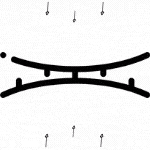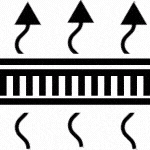100% Natural

Wool is a protein fibre formed in the skin of sheep, and is thus one hundred percent natural, not man-made. Since the Stone Age, it has been appreciated as one of the most effective forms of all-weather protection known to man, and science is yet to produce a fibre which matches its unique properties.
100% Biodegradable

When a wool fibre is disposed of, it will naturally decompose in soil in a matter of years, slowly releasing valuable nutrients back into the earth. whereas most synthetics are extremely slow to degrade.
100% Renewable

Every year sheep produces a new fleece, making wool a completely renewable fibre. Woolgrowers actively work to safeguard the environment and improve efficiency, endeavouring to make the wool industry sustainable for future generations.
Natural elasticity

Each wool fiber is a molecular coil-spring making the fiber remarkably elastic. Depending upon the quality of wool, the fiber may be stretched from 25 or 30 percent of its natural length before breaking. This characteristic reduces the danger of tearing under tension and contributes to free body movements. Wool fibers can be stretched up to 50% when wet and 30% when dry and still bounce back to their original shape when stress is released.
Resilience

Wool fabrics resist wrinkles. Wool is the most resilient fiber because it has a natural crimp that helps it keep its shape. Wool fibre is like a coiled spring that returns to its natural shape after being bent.
Breathable

Wool fibres are crimped, and when tightly packed together, form millions of tiny pockets of air. This unique structure allows it to absorb and release moisture either in the atmosphere or perspiration from the wearer without compromising its thermal efficiency. Wool has a large capacity to absorb moisture vapour, making it extremely breathable.
Odour Resistant
.gif)
Wool is far more efficient than other textiles at absorbing sweat and releasing it into the air, before bacteria has a chance to develop and produce unpleasant body odour.
Easy Care

The protective waxy coating on wool fibres makes wool products resistant to staining and they also pick up less dust as wool is naturally anti-static. Recent innovations mean wool items are no longer hand-wash only. Many wool products can now be machine-washed and tumble dried.
Multi-Climatic

Thanks to its hygroscopic abilities, wool constantly reacts to changes in body temperature, maintaining its wearer’s thermophysical comfort in both cold and warm weather.
UV Resistant
.gif)
As a natural fibre, evolved over millions of years to protect sheep against the elements, Wool absorbs UV radiation providing protection from the sun. This makes it a good choice for a wide range of outdoor activities.
Fire Resistant
.gif)
Wool’s inherent chemical structure makes wool naturally flame resistant. It is a highly trusted natural fibre in public areas such as hotels, aircraft, hospitals and theatres. Whilst cotton catches alight at 255°C, the temperature must reach 570-600°C before wool will ignite; while polyester melts at 252-292°C and nylon succumbs at an even lower 160-260°C, wool never melts so it can’t stick to the skin like many common synthetics.
Affinity for Dyes

When wool fabrics are dyed, the dye reaches the core of the fiber and bonds permanently. Wool absorbs many different dyes deeply, uniformly and directly without the use of combining chemicals. Because of their high affinity for dyes, wool fabrics dye well and evenly.






